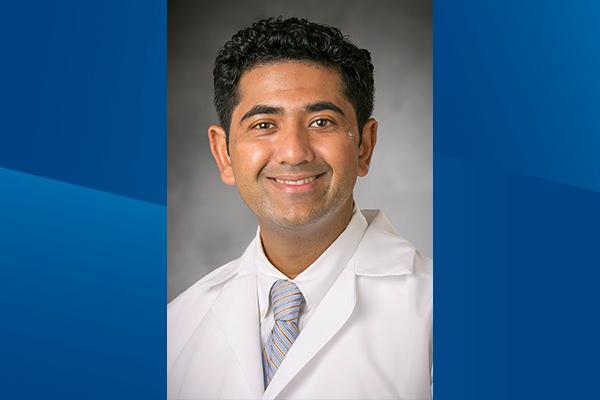
The National Institutes of Health’s National Institute of Neurological Disorders and Stroke has awarded Duke Anesthesiology’s Vijay Krishnamoorthy, MD, MPH, PhD, a five-year $3,093,447 R01 grant for his project titled, “Impact of Autonomic Dysfunction on Multi-Organ Dysfunction Following Severe TBI: The AUTO-BOOST Study.”
Traumatic brain injury (TBI) is a major public health issue and is responsible for 1.7 million emergency department visits, hospitalizations, and deaths annually in the United States. Krishnamoorthy’s research will produce key mechanistic and outcomes data to understand the impact of autonomic dysfunction following severe TBI, and guide future trials aiming to modulate autonomic function following severe TBI. In doing so, the burden of poor neurologic outcomes following severe TBI could be reduced.
Extracranial multi-organ dysfunction (MODS) occurs in approximately 60% of severe TBI patients and contributes to secondary brain injuries, increased risk for mortality, and poor functional outcomes over the year following TBI. Krishnamoorthy’s prior research has demonstrated that the prevalence of early autonomic nervous system dysfunction is high following severe TBI and associated with cerebral metabolic crisis and MODS development. Although treatments for autonomic dysfunction following severe TBI are available, a complete characterization of the course of autonomic dysfunction following severe TBI that would be adequate to guide therapy is lacking. Therefore, a comprehensive characterization of autonomic dysfunction after TBI and an understanding of how early autonomic dysfunction contributes to episodes of cerebral metabolic crisis and extracranial organ injury are urgently needed to guide the development of therapies to improve patient outcomes following TBI.
To address that need, Krishnamoorthy’s research will follow the specific aims using unique and granular waveform data from the BOOST-3 (Brain Oxygen Optimization in Severe TBI Phase 3 trial, U01 NS099946) clinical trial: 1) Determine the burden of early autonomic dysfunction and its relationship to cerebral metabolic crisis following severe TBI, 2) Determine the relationship of early autonomic dysfunction with extracranial MODS and functional neurologic outcomes following severe TBI, and 3) Assess the uniqueness and added value of cardiac waveform data in predicting risk for MODS and functional neurologic outcomes following severe TBI.
Successful completion of this study will solidify the understanding of the effects of autonomic dysfunction after severe TBI, and inform trials to determine the impact of modulating autonomic dysfunction on the development of MODS and poor outcomes following severe TBI.
“I am so excited to have the opportunity to push forward our understanding of brain injury, autonomic dysfunction and extracranial organ injury,” says Krishnamoorthy, associate professor of anesthesiology and chief of the Critical Care Medicine Division. “With the data generated from this study, we will better able to target candidate treatments in future interventional studies.”